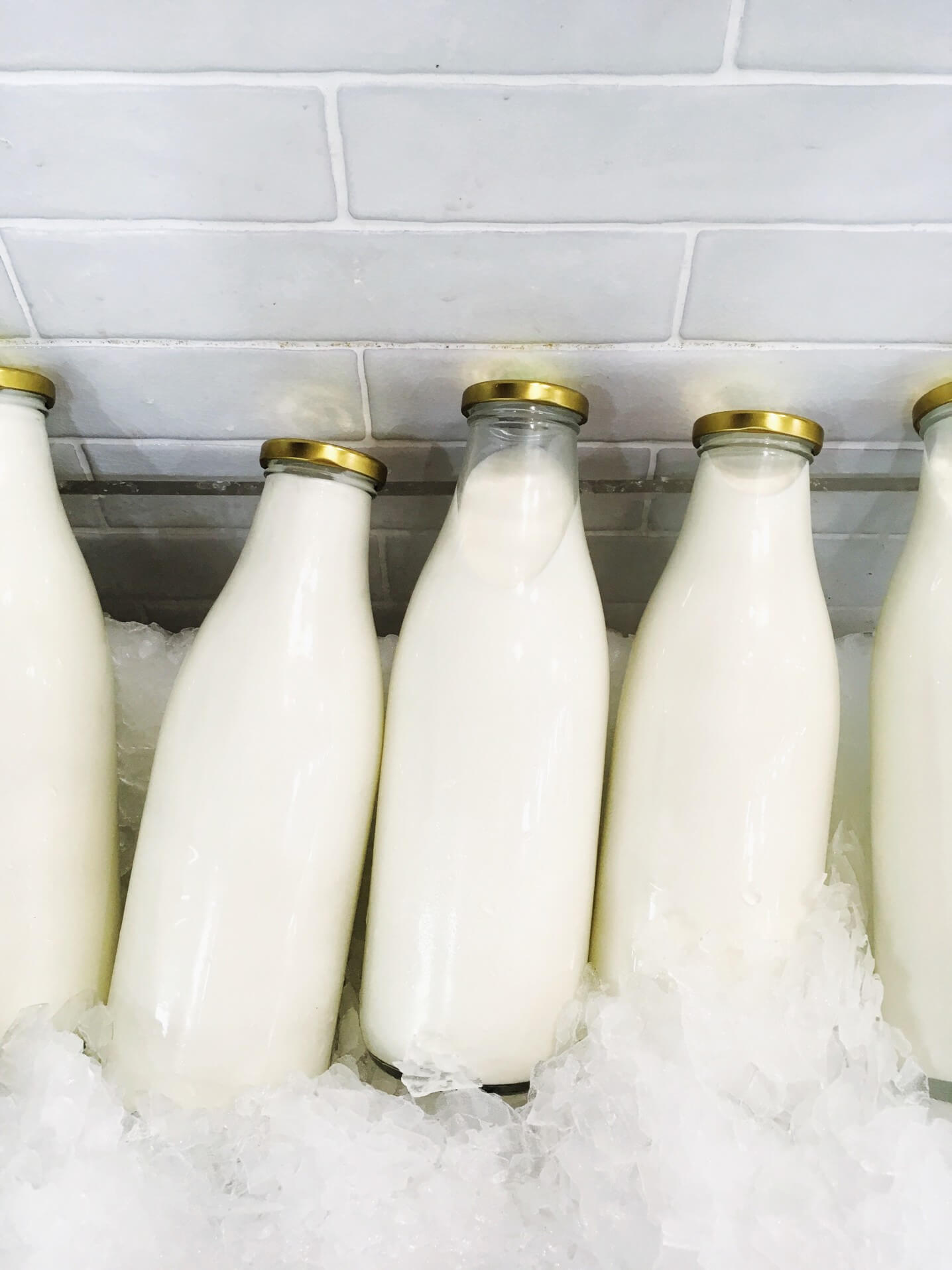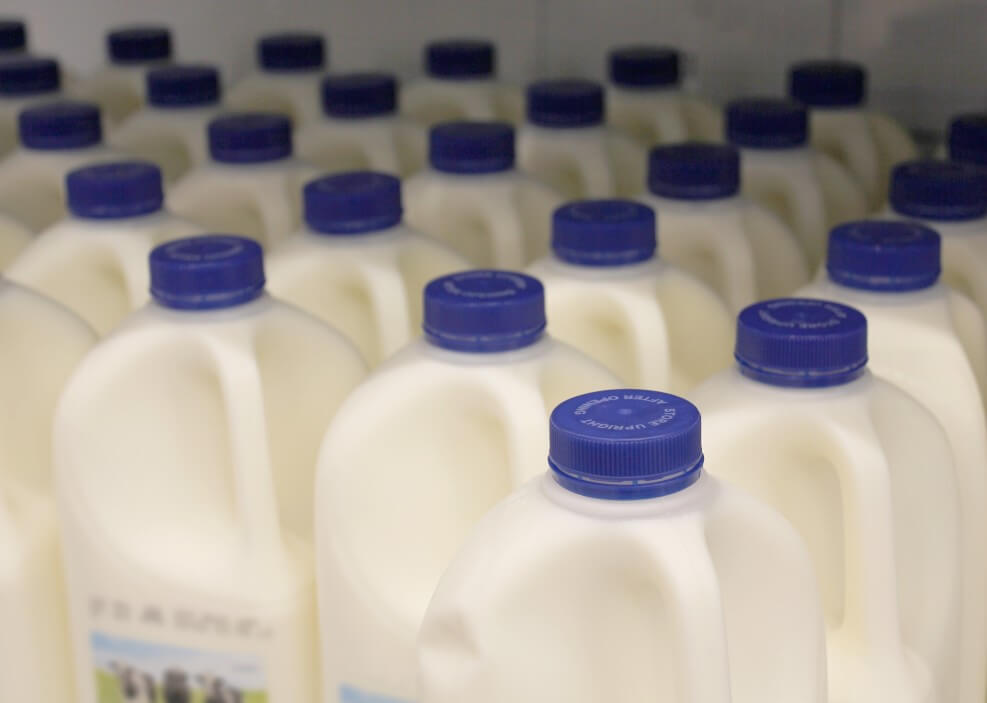In today’s world, where non-dairy milks are some of the top players in the industry, oat milk is a popular choice for those looking for alternative products.
But how does it compare to skim milk?
The most significant difference between oat milk and skim milk is that the non-dairy alternative lacks the natural nutrient content of skim milk.
However, manufacturers add many of these essential nutrients during the fortification process to ensure that their product still allows you to meet your daily dietary needs.
Continue reading to discover the nutritional content of oat milk vs. skim milk as we compare the calories, protein, fat, and carbs in each. In addition, learn the pros and cons of each of these types of milk to decide which one is best for you.
Nutrition
Oat milk is a mild and creamy milk that retains a sweet flavor even though it is low in sugar.
Skim milk provides the same calcium and protein as a regular cup of dairy milk, but it is far lower in fat.
Here is a head-to-head comparison of these two milk varieties.
1 Cup | Oat Milk | Skim Milk |
|---|---|---|
Calories | 120 | 83 |
Protein | 3g | 8g |
Fat | 5g | 0.2g |
Carbohydrates | 16g | 12g |
Fiber | 2g | 0g |
Calcium | 184mg | 300mg |
Calories
Calories describe the amount of energy in a particular type of food or drink.
A historical article from The Journal of Nutrition cites one calorie as the amount of required heat to increase the temperature from 0 to 1 degrees celsius in 1kg of water.
Nowadays, we think of calories as a unit of energy, which physicists typically describe as the amount of energy to force one newton through one meter.
A cup of oat milk typically contains 120 calories, while a cup of skim milk contains 83 calories.
Protein
Protein is a macronutrient essential for building muscle mass in our bodies.
It is also found in our bones, hair, skin, and pretty much our entire bodies as it helps make up essential enzymes that power reactions in our body and builds hemoglobin that oxygenates our blood.
According to Harvard Health, the average person requires 0.36g of protein per pound of body weight.
But it’s not just meat and dairy that can provide us with this essential building block.
We can also obtain adequate amounts of protein through plant alternatives such as whole grains, nuts, beans, and legumes.
A cup of oat milk typically contains 3g of protein, while a cup of skim milk contains 8.3g.
Fat
It’s vital that we have small amounts of fat in our diets to provide our body with fatty acids that aid in absorbing essential vitamins such as vitamin A, vitamin D, and vitamin E. But fats are high in energy.
According to the NHS, one gram of unsaturated fat equals four calories, while a single gram of saturated fat is the equivalent of nine calories.
And it’s high levels of saturated fats that can pose serious health risks to our bodies, including increased cholesterol and a higher risk of heart disease.
According to the Cleveland Clinic, a healthy diet is one in which around 20 to 35% of the total number of daily calories are obtained from fat.
At the same time, the AHA recommends that no more than 6% of our daily total should come from saturated fat.
A cup of oat milk typically contains 5g of fat, while a cup of skim milk contains 0.2g.
Carbs
Carbohydrates are sugar molecules that comprise one of the three primary nutrients found in food. These are essential in any diet as they help your body turn food into energy, giving you the ability to go about your day-to-day business.
But the number of carbs you consume will affect your blood sugar; too much and you’ll be at risk of diabetes; too little and you’ll develop hypoglycemia.
You’ll find three key types of carbohydrates in your food and beverages: starch, sugar, and fiber. Starches are complex carbs that provide vitamins and minerals to your body. Fiber is a healthy complex carb that aids in digestion and regulates blood sugar.
Fiber also maintains healthy cholesterol and keeps you feeling fuller for longer so that you’re less likely to snack on unhealthy foods. In comparison, sugar is a simple carb that provides a quick burst of energy (often followed by a slump).
There are two types of sugar, naturally occurring (the kind found in milk) and added sugar (found in sweet foods such as candy bars, ice cream, and soda drinks).
According to Mayo Clinic, carbohydrates should comprise between 45 - 65% of an individual's total number of daily calories.
A cup of oat milk typically contains 16g of carbohydrates, while a cup of skim milk contains 12g.

Taste
Oat Milk Flavor Profile
Oat milk has a similar flavor to cow's milk, though it is noticeably sweeter.
And this sweet aftertaste combined with an oaty flavor profile makes it the perfect accompaniment to several drinks and meals, from the creamy froth atop your coffee to the sweet delight in a morning bowl of cereal.
Oat milk is creamy with a smooth and silky texture that coats your mouth (like cow's milk but without the fat).
If you add preheated oat milk to a hot beverage, you'll likely taste some earthy notes, whereas if you pour unheated oat milk into your drink, it will be far sweeter, and you may even notice some caramel tones in the flavor profile.
Related: What Does Oat Milk Taste Like?
Skim Milk Flavor Profile
Skim milk is a dairy variety of milk with all of the fat removed from it.
During this process, a lot of the taste and texture can also be removed. So if you compare skim milk to regular milk, it is far more watery and a lot less sweet.
However, many companies are working to increase the flavor of their skim varieties.
Several products offer a sweet but refreshing flavor that does not overpower the surrounding food or drink.
Skim milk may be perfectly sufficient in a bowl of cereal, but it's less likely to stand up in cooking or baking where a richer flavor is required to balance out the taste.

Oat Milk Pros & Cons
Pros
Oat milk is an excellent option for people wanting to adopt a plant-based diet.
If you're looking to banish meat and animal products from your diet, then products such as oat milk are a great way to get you started.
Replacing dairy milk with oat milk means that you don't have to compromise on the flavor or texture of this creamy beverage.
In addition, you can still enjoy many of the health benefits of a regular glass of dairy, providing that you pick a product that has had a nutrition enhancement.
Related: Is Oat Milk Healthy?
Oat milk is an excellent alternative for people with allergies.
Oat milk isn't just for those wanting to adopt a vegan lifestyle; it's also for people with allergies and intolerances.
The beautiful thing about oat milk is that it caters to various dietary needs.
Oat milk has you covered whether you're looking for a dairy, gluten-free, soy-free, or nut-free product.
Always check the label before purchasing to ensure the ingredients.
Still, as many of these products are made from oats and water, there is a significantly reduced chance of intolerance.
Related: Is Oat Milk an Allergen?
Cons
Natural oat milk doesn't contain the same nutrition as a glass of dairy milk.
Oat milk doesn't have the same naturally occurring blend of essential vitamins and minerals as dairy milk.
While many brands enhance the nutrition profile of their beverage by fortifying the oat milk with the same quantities of calcium, plus vitamins A and B12, the same isn't true across the board.
Dairy milk is a great natural provider of several essential vitamins.
If you want to retain this high nutrition level from a non-dairy milk source, check out the packaging before purchase.
Oat milk has far less protein than skim milk.
When it comes to protein, oat milk falls behind almost every other type of milk, including dairy, pea, and soy milk.
However, it's not all bad news; the 3g of protein present in a cup of this oat beverage stands up against many other non-dairy milk varieties such as almond, cashew, rice, or coconut milk.
And combining oat milk with a hearty bowl of whole grains can be a great way to increase your protein consumption.
Oat milk is best for
- Vegans / people on plant-based diets
- Individuals with dairy, lactose, gluten, soy, or nut intolerances
- People looking for a milk alternative that retains a similar flavor profile

Skim Milk Pros & Cons
Pros
Skim milk has a higher protein and calcium count than oat milk.
Dairy milk is an excellent source of protein and calcium in our diets.
If you rely on milk to boost these nutritional needs, it may be better to stick with a diary variety rather than switching to oat milk.
One cup of skim milk has almost twice as much calcium and more than twice the amount of protein as oat milk.
These are essential elements for keeping our teeth and bones strong and healthy and helping our muscles function correctly.
Skim milk has less fat than oat milk.
The point of skim milk is that all the fat has been removed - that's literally what skim milk is.
While oat milk has far less fat than the average glass of cow's milk, the same is not true when we compare it to the skim variety.
Bear in mind that some fat is good in our diet, but it's crucial to maintain the right balance.
If minimizing the fat in your diet is your number one priority, then skim is the best product for you.

Cons
Skim milk isn't suitable for vegans or people with lactose intolerance.
One of the main reasons oat milk is increasing in popularity is that it satisfies so many people's dietary needs and preferences.
Oat milk is dairy-free, lactose-free, gluten-free, nut free, and soy-free - skim milk cannot match up on those fronts.
If you're looking to move to a plant-based lifestyle or dealing with lactose intolerance, then skim milk is not the product for you as it still contains many of the same qualities as a regular cup of cow's milk.
Related: Do Vegans Drink Skim Milk?
Skim milk lacks flavor if you use it for cooking or baking.
One of the great things about oat milk is that it retains a full and rich flavor profile.
The problem with skim milk is that removing fat often sacrifices a lot of the flavor.
If you try to replace regular dairy milk with skim milk while cooking or baking, you will notice a significantly different flavor in your finished dish.
If you're looking for milk for this purpose, you'd be much better off with a richer flavor profile such as that found in oat milk.
That being said, the lighter taste of skim milk can increase its versatility as it won't overpower the other flavors in a dish.
Skim milk is best for:
- People wanting to lose weight
- Those wishing to balance the amount of fat in their diet
- People looking for a healthier alternative to dairy milk who want to retain the full-fat variety's protein and calcium content.
Conclusion
Oat milk and skim milk are excellent alternatives to the full-fat dairy variety.
Oat milk is great for people on a plant-based diet or those with allergies who want a product that suits their dietary needs without compromising texture or flavor.
Skim milk has a lighter flavor and may not suit all diets and cooking needs.
Still, it's excellent for people who want to make a healthier lifestyle choice by reducing the amount of fat in their diet while maintaining good levels of protein and calcium.
